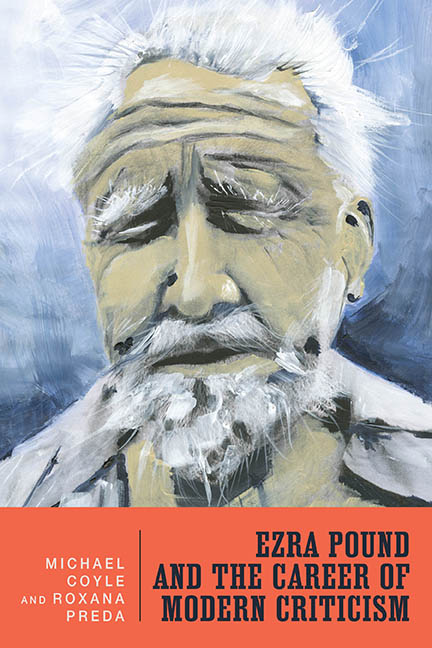Book contents
- Frontmatter
- Dedication
- Contents
- Preface
- Acknowledgments
- 1 From Wabash to Washington, 1907–1947
- 2 A Prize Fight and Institutionalization, 1948–1951
- 3 Kenner, Watts, and Professional Attention, 1951–1961
- 4 Sailing after Knowledge, 1962–1971
- 5 The Pound Era and Its Monumental Companion, 1971–1985
- 6 Pound Studies and the Postmodern Turn, 1980–1990
- 7 Reading Pound in the New Millennium, 1990–2016
- 8 The Many Lives of Ezra Pound: Biographies and Memoirs, 1960–2015
- 9 Educating the World: Periodicals on Ezra Pound, 1954–2017
- Conclusion
- Chronology of the Bollingen Controversy
- Works Cited
- Index
2 - A Prize Fight and Institutionalization, 1948–1951
Published online by Cambridge University Press: 17 July 2019
- Frontmatter
- Dedication
- Contents
- Preface
- Acknowledgments
- 1 From Wabash to Washington, 1907–1947
- 2 A Prize Fight and Institutionalization, 1948–1951
- 3 Kenner, Watts, and Professional Attention, 1951–1961
- 4 Sailing after Knowledge, 1962–1971
- 5 The Pound Era and Its Monumental Companion, 1971–1985
- 6 Pound Studies and the Postmodern Turn, 1980–1990
- 7 Reading Pound in the New Millennium, 1990–2016
- 8 The Many Lives of Ezra Pound: Biographies and Memoirs, 1960–2015
- 9 Educating the World: Periodicals on Ezra Pound, 1954–2017
- Conclusion
- Chronology of the Bollingen Controversy
- Works Cited
- Index
Summary
It is necessary to see Pound under two aspects: as he worked upon poetry and as he worked upon the public.
—John Berryman, “The Poetry of Ezra Pound”Reconsidered Passion
HISTORY,” T. S. ELIOT ONCE HAD WRITTEN, “has many cunning passages, contrived corridors.” And it “gives too late / what's not believed in, or if still believed, / In memory only, reconsidered passion.” Between 1941 and 1951, between his first regular broadcasts over Rome radio and Hugh Kenner's establishment of “Pound studies,” Pound saw his stature and status changed radically by forces over which he himself no longer exerted control. It was an experience virtually without precedent in literary history: Pound, still furiously active as a writer, became the nearly helpless witness to his own canonization. When his Bollingen Prize—endowed by Paul Mellon, but administered by government agency—was announced (February 20, 1949), Pound received a longawaited formal tribute. But “a man situated as [was] Mr. Pound,” as the Fellows’ public announcement delicately put it, was no longer capable of defining the terms of his own recognition. Perhaps no writer is; perhaps without the New Critical principles on which his award was predicated, Pound would have received no recognition at all, or at least for some time to come. Be that as it may, after his award, Pound “became his admirers”— and in ways rather different than those imagined by Auden. This is not to say that Pound himself changed either personally or artistically, but that his work assumed a different kind of public presence. The energetic iconoclast became the professors’ poet; the reformer who had so often pitched his appeal to those excluded from university education came to depend on the academy for the audience that was at last, mostly, prepared to meet him.
By no means sudden, this transformation was still incomplete even a decade later. But the Bollingen controversy conceived for Pound a new pattern of reception, becoming a battleground decisive in the New Critics’ establishment of institutional authority. Their victory, however, exacted a price paid both in the terms by which Pound gained academic acceptance as well as in the terms whereby a suspicious public was persuaded of its inability to judge literary matters.
- Type
- Chapter
- Information
- Ezra Pound and the Career of Modern CriticismProfessional Attention, pp. 23 - 46Publisher: Boydell & BrewerPrint publication year: 2018



